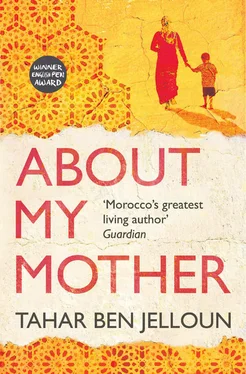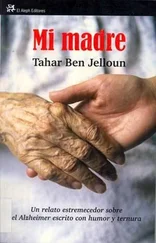Keltum rolls her eyes and says: ‘This is what it’s like all day long, she never stops. Sometimes it’s her brother who comes but doesn’t speak to her, sometimes it’s her mother who visits and wants me to make a pastilla … We’re living with ghosts here, she must see them. I can’t see a thing. Sometimes I wonder, maybe she really can see all those dead people holding out their hands to take her away with them. I admit I’m scared, but at the same time I’m still sane, I know she’s hallucinating, but you can never tell. The dead and buried turning up in the house, it’s spooky, but seeing as she thinks she’s in her house in Fez, I feel better. It’s all happening over there, and we’re safely here in Tangier. She has no idea where she is any more. When her mind first started going, I’d correct her, remind her exactly what was what. She’d be shocked, she’d look at me in disbelief, and then say: “Either you’re mad or it’s me who’s crazy!” She’s been crying for three days, especially when the two of us are alone together. She sobs her heart out, not only because of her own situation, but because she claims her mother’s just died and has only been half-buried, without her body being washed according to Muslim tradition. It’s all very well me telling her that her mother’s been in the ground for thirty years, there’s nothing to be done. She insists it’s so and goes on crying like an inconsolable child. Then she says her daughter’s funeral was a bit run-of-the-mill. That annoyed me. I told her that Touria’s still alive, that she’s just come back from Mecca and that she’d talked to her on the phone the day before. Then she stopped and said: “If my daughter’s not dead, then who did we bury yesterday?” “Nobody, you’re imagining things, you’re seeing things that aren’t there.”’
Keltum comes into the bedroom, closes the door and sits on a chair, looks at us and says: ‘Since you’re all here, I have to tell you I can’t do this any more. Your mother’s my best friend, but I’m worn out, she wears me out. I need a holiday, a change of scene. I want to go and spend a few days with my children and my grandchildren, but I can’t leave her. When I go out to do the shopping in the morning, she begs me to come back quickly. I don’t want to hurt her. Twenty years ago, I cleaned for her. Now, I’m her friend, her daughter, her mother, her everything. And I love her too and I can’t bear it when she’s delirious, it hurts me. There’s maybe fifteen or twenty years between us, but I’m afraid I’ll end up like her, trapped between madness and insomnia. So I pray to God and I take care of myself. I too have my rheumatism, my headaches and my stomach aches. I try to look after myself, my children need me. Every so often I snatch a few hours and go to see them, sometimes they come and visit me here. It brings a little life into this old house. It’s not easy, but what can I do? It’s God’s will that I should be with this good lady in her last days. It’s the nights that scare me, I don’t know how to dial telephone numbers and Ahmed rarely sleeps here. I panic when she’s distressed and I’m afraid when I stand there helplessly and she has one of her turns. You should tell Ahmed to spend the night here in the house. He’s a man at least, he could be useful in an emergency. Rhimou wouldn’t mind. That’s all I have to say. I’ve learned her medication by heart. Luckily, all the pill packets are different colours. Sometimes I pass the time going over her prescription: in the morning, one pink pill and half a white one; at lunchtime, two white ones from the green packet; in the evening, half a pill from the blue-and-yellow packet, plus a sachet. That’s easy, I know she has to have the sachet before dinner. When the doctor changes her prescription, I panic, but I cope, I manage to work it out and I hope I never get it wrong. In any case, I’ve got good eyesight and my health is good. I’m at risk too, I’m no spring chicken and life is hard. Luckily we have this bond of friendship, I do good, you do good, and may God help and protect you.’
Not everyone shares this near idyllic view of their relationship. I close my eyes and let it go. Is there any choice? After all, it’s my mother who wants Keltum with her and always asks for her. We mustn’t upset this precarious equilibrium. As for Rhimou, who says nothing, what does she think? She does the cleaning, follows the Brazilian soap opera Esmeralda avidly, says her prayers and protests when Keltum bullies her. We sometimes catch a glimpse of the three of them behind closed doors: the sick woman, the woman in charge and the maid. There’s also Ahmed, whose scheming remains a mystery.
I read in a newspaper that illiterate people are more likely to suffer from Alzheimer’s than those whose intellectual activity has been more intense. My mother used her grey cells to imagine a different life, to shield us from harm and watch us grow up under the wing of her blessing. Her intellectual range is very limited: she knows a few verses of the Qur’an by heart, her usual prayers, entreaties to God and His prophet, and a few folk songs. So she lives with very few things coming and going inside her head. She knows the workings of the traditions of Fez by intuition and habit, how to find her way through the maze of the old medina.
Alzheimer’s invaded this modest brain without resorting to violence. Mother sometimes has lucid moments and can laugh at her own failings. As time goes by, these moments are less and less frequent, and they’re briefer. She’s not in pain, she’s bored, so she forgets the present and takes refuge in her distant past. She’s alone, surrounded by ghosts and shadows from those kinder days.
I wonder whether Keltum’s angry outbursts are caused by exhaustion and having to repeat the same words over and over again, or because she’s afraid she’ll end her life like my mother.
Thinking of this collapse, when the person you love goes missing and time stretches and disintegrates, you look at your own shattered image in that unreliable mirror and scrabble around for happy moments, hoping to fill these cracks in the soul and salvage words from this agonising confusion.
My grief surfaces. I must have a change of scene. I think of Zilli, Roland’s mother, I see her in 1940s Vienna, beautiful and in love, beguiling, vivacious, travelling with lots of suitcases and trunks, so carefree, playing the piano just before taking the train to Paris, on the verge of a magical love affair.
Mother isn’t mollified. She weeps and asks for her mother and her little brother. Keltum’s at the end of her tether. She either snaps, declaring they’re long dead and buried, or she plays the game and joins her in her fantasies. She put her in the wheelchair and pushed her all around the house, in pursuit of the dead. ‘There, my love, don’t worry, we’re going to find your mother and your little brother, your favourite, too. Maybe they’re hiding under the bed or behind the curtains. Hush, don’t worry, darling, I’ll pull back the curtains. Oh, they’ve gone, they’re quicker on their feet than we are. Just a minute, let’s go and look in the big wardrobe. I can hear muffled laughter, I expect it’s them making fun of us. Don’t move, don’t cry, we’ll find them, we’ve got plenty of time. Yes, I’ve made dinner, I cooked for them too. Your mother loves lamb tagine with quince and okra — she adores that slimy vegetable. I hate it. I know I’m a simple country woman, not refined enough to eat okra, but I’ve cooked it for your mother. Come on, let’s take you into the sitting room. I can’t see anyone, they’re not in here. You say you can hear and see them, all right, but if you’ve seen them we can stop looking. That’s right, we’ll go back to your room. You invited them for dinner, that’s good. I’ll have to leave you to go out and buy some bread. You can’t have a tagine without bread. I’m going to leave you for a few minutes. I’ll settle you back in your room, then I’ll lay the table and go to the bakery to get some warm bread. Why are you crying? You want a silk scarf, no, not a scarf, a headscarf, a dishcloth to play with, you want money to go to the jeweller’s. Why don’t you wait until your son comes and he’ll give you some money, a wad of notes, but you take your pills now, while you’re waiting. It’s the yellow packet, no, I’m not sure, I’m worried I’ll get it wrong. You’re confusing me, I don’t know what I’m doing any more. You’re getting me flustered, I’m tired now. We have to call your daughter. After all, it’s her duty. I know she’s ill, it’s the time of year when it all flares up. It’s too bad. I’m here, I’ll always be here, it’s my life, my destiny, that God has written for me …’
Читать дальше












